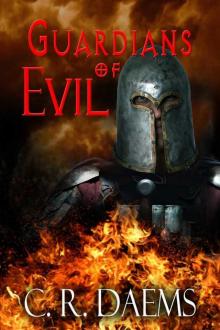- Home
- C. R. Daems
The Black Guard
The Black Guard Read online
THE BLACK GUARD
by
C. R. Daems
The Black Guard
Copyright © 2014 by C. R. Daems
No part of this book may be reproduced or transmitted in any form or by any means, graphic, electronic, or mechanical, including photocopying, recording, taping, or by any information storage or retrieval system, without permission in writing from C. R. Daems.
This book is a work of fiction. Names, characters, places, and incidents are products of the author’s imagination or are used fictitiously. Any resemblance to actual events or locales or persons, living or dead, is entirely coincidental.
ISBN-13: 978-0-9911060-1-1
ISBN-10: 0991106016
Check out all my novels at:
http://www.crdaems.com
CHAPTER ONE
The Least Favorite Child
CHAPTER TWO
The Black Guard
CHAPTER THREE
First Assignment - Lanzhou
CHAPTER FOUR
Returning Heroes
CHAPTER FIVE
Molova: Prince Badal
CHAPTER SIX
Molova: The trip to Hezou
CHAPTER SEVEN
Molova: Hezou. Meeting of the Princes
CHAPTER EIGHT
Molova: Hezou. Revenge
CHAPTER NINE
Jax: Family Reunion
CHAPTER TEN
New Keif: The Siege at Brasilla
CHAPTER ELEVEN
Jax: Sasser Mountain. Dragon Training
CHAPTER TWELVE
Faithful: The Prison at Suryah.
CHAPTER THIRTEEN
Faithful: The Assault on OCC-7.
CHAPTER FOURTEEN
Avivo: Family and Buddhism
CHAPTER FIFTEEN
Halo: The Magistrates of the Halo Alliance
CHAPTER SIXTEEN
Halo: Friends of Captain Gasparo
CHAPTER SEVENTEEN
Jax Contract Committee: Interview
CHAPTER EIGHTEEN
North Song: The Warlord Shin
CHAPTER NINETEEN
North Song: The Warlord Daiki
CHAPTER TWENTY
Jax: The Committee’s Decision.
Novels by C.R. Daems & J.R. Tomlin
CHAPTER ONE
The Least Favorite Child
"Father, why me?" I asked.
"It’s beyond my control, Rivka. The government demands each family with three children must send one to the military. The child must be between six and ten. Adam is eleven, and Alvah is only two. You’re the only one between six and ten," he said, and a small smile touched his lips. Mother sat feeding Alvah, pretending not to hear us.
"You could wait for Alvah to turn six, like you waited for me—"
The slap spun me around and sent me to the floor. I lay there dazed with tears stinging my eyes—not from the pain of the blow but from the coldness in my father’s eyes and my mother’s indifference.
"You will show me respect, child. I shall never understand why the military takes women. Our teachings tell us their place is in the home as humble helpmates not soldiers, but since they do, you’ll serve your brothers by relieving them of the duty. Now go to your room!" He pointed to the door which led into the hallway and the back of the house. My stomach lurched as I rose to my feet and staggered out of the room. Adam snickered as the door closed behind me. In the hallway, I leaned back against the wall waiting for my head to clear.
Beyond the door, my mother said, "She’s very young, Abram. Maybe we should wait a year or two." Her voice was barely above a whisper.
"Leave it be, Ednah. The decision is made. They will be here in five days to pick her up."
I had done my best to please my father without success. He doted on Alvah, and Adam was his pride and joy. Mother was too busy caring for the three of them, spending hours every day on her knees in prayer, and running the household to worry about me. I was little more than an extra set of hands to help with the work. Besides, she would never speak out against my father. It wasn’t her place.
While waiting for whoever to collect me, I found places out-of-sight so I wouldn’t be seen crying. Not that anyone cared. I was a ghost—unseen, unheard, uncared for. By the fifth day, I couldn’t cry any more. I felt dead inside. So when the knock came and my father opened the door, I walked past him, out the door, and stopped next to the man waiting there.
"Mr. Sapir?" The man asked. When my father nodded, he continued. "I’ve come to pick up your daughter… Rivka. I assume this is her," he said with an amused snort.
"Yes, that’s her. Aren’t you going to say goodbye, Rivka?" He hadn’t talked to me all week, no one had. I would have liked… something. Some sign they would miss me, if just a little. Anger surged through me, and I looked back at him. "I hate you," I whispered and turned to the man who had come for me. He stood a head taller than my father, muscular, and clean-shaven. His uniform was a dark spinach-green. The pants were tucked into black-leather boots, and a big gun was strapped to his right thigh. His shirt was tucked into his pants, and on the sleeve of the right arm, two finger-width bands of light-green above a light-green dragon. He looked down at the screen on the device strapped to his arm, then at me, and smiled.
"Hello, Rivka. It’s nice to meet you. You look ready to leave."
"Yes, sir."
"Good." He tapped the device and a silver disk emerged, which he handed to my father. "Thank you, Mr. Sapir. This acknowledges your compliance with the Jax Conscript Law." Without another word he put a hand on my shoulder and walked me to a khaki-colored ground-vehicle parked in front of our... . . . their house and opened the rear door. Inside sat two other children, a boy and a girl about my age.
The boy looked me over and grinned. "Hi, I’m Shem. She’s Abiy." The boy nodded in the girl’s direction. "Don’t look so unhappy. It’s a nice place we’re going. Lots of games and fun."
Abiy looked like I felt, with her eyes puffy and red.
"How do you know?"
"My father told me."
"Has he been there?"
"No, but he’s smart and knows everything." A grin split his round chubby face. "Besides, we can leave whenever we want."
I felt dazed, lost. Shem’s father was smart not to tell him the truth. When I climbed silently in to sit beside Abiy, he went back to playing some game on his small tablet. No one talked as the hours passed and the city faded into the distance, and Lake Ohrid grew in size. The cloudy weather, which matched my mood, made the water look almost black. Before reaching the lake, the vehicle turned onto a narrow road and headed towards a group of gray buildings where several black planes sat looking like beetles. I trembled as we were led towards one and the unknown. I didn’t know where I was going, or what I’d be forced to do when I got there, or how I would be treated.
We entered through the rear, up a ramp. Inside, another ten children sat strapped to the benches that ran along each side. A few looked like Shem and the rest like Abiy and me—the ones who weren’t lied to. After ensuring we were strapped in, the ramp rose sealing the back, and the shuttle shuddered as it lifted into the air. I sat lost in my misery, my throat burning from the bile that repeatedly rose into my mouth. My head pounded like hundreds of people were beating against the inside of my skull to get out. The nightmare seemed to last an eternity, and I failed to notice we had landed until the ramp in the rear opened.
We were unbuckled and helped out by two men in dark-green uniforms who led us across a dry, dusty field bare of grass or trees to a long, one-story, gray building. Inside, a center aisle separated two long rows of single beds. A small table sat next to each bed and on each a pillow and a pile of bedding. We were lined up, measured, given loose-fitting gray pan
ts and shirts and slipper-like shoes, and assigned a bed. After dressing in the new clothes, our old clothes were taken, and we were led through the dry heat to a nearby building. Although the room was huge, most of the seats were filled with children around my age.
After everyone was seated, a woman in the same dark-green uniform entered. She was a tall, thin, stern-looking woman, with a narrow face and short black hair. Her sleeve had the same light-green dragon, but instead of bands, she had a star above it.
"I am Lieutenant Vogel, the senior instructor at Camp Lozn."
I gaped at the sight of a woman commanding all these people—men. In the church my father had taken us to, the women sat in the back, quiet, with their eyes cast down. I felt confused, frightened.
She continued, "This is the first of several schools you will attend over the years, and you will be here for four years. There are four Jax military schools: the navy, army, commandos, and the guard. Those of you over the age of eight will be assigned to the navy school. Those under eight will be assigned to the army school. Your position in the Jax military depends upon your performance." She stopped to take a drink of water before continuing. "We have rules and you must obey them. Your instructors are not being cruel when they enforce the rules. Our schools are demanding and will require your best effort. Those who work hard and obey the rules will be rewarded."
And those that don’t? I wondered. I noticed she didn’t say they would be sent home. Not that it mattered. Even if they let me leave, where would I go? My parents’ house was no longer my home. I no longer had a home.
Lieutenant Vogel spent the next hour going over the rules and used an aerial picture of the compound to orient us. There were seven buildings: two long buildings for meals and sleeping, three square buildings for classes, and two smaller ones which were off limits. Afterward, she led us back to the sleeping building—barracks. To my embarrassment, boys and girls shared the same toilets and showers. Two uniformed men watched as we bathed and dressed for bed in loose, gray shifts. Shem shuffled past me, his cheeks tear streaked. Perhaps it would have been easier for him if he had known the truth from the start.
* * *
The days settled into a routine that made it difficult to determine the day of the week, or the week of the month, or even the month. Every day was the same: up at dawn, exercise, morning meal, classes, midday meal, classes, evening meal, study, wash, and to bed. Every other day we were given two hours freedom out in the dusty grounds. I normally took a book with me to study while the others formed in groups to talk or play games. Ironically, I liked having so little free time. There was no time to sulk about yesterday or wonder about tomorrow—just today, only today.
Lieutenant Vogel had been right. Our instructors were not cruel. Most were helpful if you had questions, although some were impatient and snapped if a student didn’t have an answer ready. I tried to make sure I did.
I took comfort in the school work. It not only kept me from thinking about the past or worrying about the future, but I found the classes interesting. In addition to the basic subjects we would have learned in any city school, we were being taught how to read and write in the common trade language, Standard, and about the inhabitable planets in our galaxy—there were over a hundred united under four governments.
Those that work hard and obey the rules will be rewarded," was burned into my six-year-old brain, and I was determined not to find out what happened to those who didn’t. The other children soon formed friendships, and some teased me and called me names because I didn’t join in, preferring to spend my time bent over my books. "Ugly string bean" was one of their favorites. It stung, but they couldn’t hurt me the way that I feared our instructors could. They couldn’t send me away to who knew where. Two children had already disappeared from our barrack and classes, one of them Abiy. I was afraid to ask where they had gone. The only other girl who spent as much time bent over her books was a sturdy, muscular girl named Hada Attali. Like me, her focus on her studies made her a loner.
She and I had begun working together by accident. I had a problem I couldn’t seem to master no matter how hard I tried. She always had the right answer when called on in class, so I was sure she was the smartest. I blushed and stammered when I asked her for help, but she smiled and patiently showed me where I was going wrong. She helped me and over the many months—maybe a year or more as there was no way to tell time—we found studying together benefited us both.
"Why do you work so hard?" I asked one day as we labored over a math problem.
"Why do you?"
"My parents didn’t want me, so I have nowhere to go if the military doesn’t," I said, thinking her reason more or less the same.
"I’m sorry… That’s why you always seem so sad."
"Isn’t that why you’re here?"
"My father follows the ancient Taoist religion and customs. I have two sisters. He picked me because he said I had the best chance of becoming a Dragon in the Black Guard, and it would be a life I would love."
"What is the Black Guard? They say we are going to be in the army or commandos and assigned to a spacecraft. And go to war…"And get killed or crippled and kill people… the thought made me sick.
"We will spend four years here getting a basic education, learning how to read and write Standard, and studying about the people on the other inhabitable planets. Then most will be transferred to the army school to become soldiers. A few who have done well in their studies will go to the commando school where they will concentrate on becoming commandos: self-defense, weapons, tactics, and other things," she said, smiling as she watched me frown. She had just confirmed what I thought. "And then the good part. They will again split us into two groups. Most will go to another school where they will finish commando training. A few will go to the Black Guard School. They are the elite of the Jax military. And there, the few who have worked very hard will receive training that will bring you peace and a special place in the Guard."
"How does your father know?" I asked. It sounded like a wonderful story to tell the least-liked child that you decided to get rid of without hurting her feelings.
"My father was a senior sergeant in the Black Guard for thirty years. That’s why he let me come here early, so I would be put into the army school, and it’s the reason I study so hard. I don’t want to be a commando." Hada gave me a conspiratorial look with one finger to her lips. She sounded like she knew what she was talking about. If not, her father was a great liar. It didn’t matter. This was the nearest thing I had to a home, so I would do my best to remain. If working hard got me the reward Hada described, so much the better.
She briefly squeezed my hand. "You’ll be all right, Rivka. You’ll see."
* * *
The time passed, and I mastered Standard and the other subjects. The morning exercises were the hardest. We were learning repetitive moves called dances that were used to learn and perfect a variety of fighting techniques. Towards the end of what Hada call the "Basic" school, the classes included actual fighting. Even with the protective gear we were required to wear, the kicks and punches hurt, and you could get injured. I hated those classes. Hada’s father had given her some basic Black Guard training that she taught me in our few free hours, so I did well as far as our instructor was concerned.
During those years, we lost ten more of our class. At breakfast or lunch they were led away, never to be seen again. Hada said they didn’t pass for one reason or another and would be assigned to the army. Whether she was right or wrong, it just made me work harder.
CHAPTER TWO
The Black Guard
One day, instead of our normal classes, we were assembled in the large lecture hall. When we were all settled in our seats, Lieutenant Vogel strode onto the stage.
"We have been evaluating you for the past four years in an effort to determine where you would best meet the needs of the Jax military. You have all worked hard or you wouldn’t be going on to a new school," she said, confirming that no
thing good happened to the ones who had disappeared. "Most of you will be leaving tomorrow for the army school at Harbin; the others will be transferred to the commando school at Riyah.
It brought back that same helpless feeling I had when I first arrived at Camp Lozn—others were running my life. I didn’t want to be in the army or the commandos, and I doubted I’d like the Black Guard. But worse than that, I’d be alone again if they separated Hada and me. She was my one link to sanity.
"The list has been posted in your barracks. Those going to Camp Harbin will be packed and in formation outside of the barracks at eight hundred hours tomorrow. Those going to Camp Riyah will assemble there at eleven hundred hours. Dismissed," an army sergeant shouted and everyone made a wild dash to get out and see the list. Hada and I remained seated.
"Aren’t you interested?" I asked Hada.
"Of course, silly. You and I are at the top of all our classes so I know we will be going to Camp Riyah. It’s our reward. I just thought we would wait until the fighting to see the list died down." She laughed, forcing me to smile. I desperately hoped she was right.
When we arrived a half hour later, only a few of our classmates were hanging around the board—some happy, some muttering angrily, another openly weeping. Ironically, not everyone wanted to go to the commando school.
"See, I told you," Hada said, pointing to my name and hers. "Riyah."
I took a deep breath, realizing that I had been holding it as we approached the board. I didn’t care which school so long as Hada was going to the same one, but I was happy she got the school she wanted.
During my time at Camp Lozn, I had grown twenty-nine centimeters and gained twelve kilo. I now stood one hundred forty-one centimeters and weighed thirty-two kilo.
* * *
The next day, forty of us were loaded onto combat shuttles and flown to Camp Riyah in the northern part of Jax. The grounds were grassy, shaded by huge trees, which was a nice change from dry, dusty Lozn.
We continued to have classes in roughly the same subjects but at an advanced level. And we began weapons training and the art of war, in the classroom and with field problems designed to test individual and squad performance. During squad exercises, we took turns at each position: leader, second, scout, explosives. Self-defense classes involved more advanced techniques, and supervised fights occurred several times a week. I enjoyed the class work, academic as well as the tactical war theory. I disliked the field exercises. I did well only because I worked extra hard preparing for them. Hada’s promise of the Black Guard drove us night and day. I hoped she was right, because I could tell I would hate being a commando. Would I like being a Black Guard better? It didn’t matter. At least, I would be with Hada.

 The Phoenix Wars: Book I, Reprieve
The Phoenix Wars: Book I, Reprieve Tasmanian SFG, Book II: Devils to Me (Tasmanian series 2)
Tasmanian SFG, Book II: Devils to Me (Tasmanian series 2) The Red Admiral
The Red Admiral Tasmanian SFG: Welcome to Hell
Tasmanian SFG: Welcome to Hell Megan
Megan Desperate Measures: The Issog
Desperate Measures: The Issog Red Angel: Coup d'etat (Red Angel Series Book 5)
Red Angel: Coup d'etat (Red Angel Series Book 5) The Shadow Ryana (The Shadow Sisters Book 1)
The Shadow Ryana (The Shadow Sisters Book 1) Riss Series 5: The Riss Challenge
Riss Series 5: The Riss Challenge Red Angel: Book III: Hijackers
Red Angel: Book III: Hijackers The Riss Proposal: Book II in the Riss Series (Volume 2)
The Riss Proposal: Book II in the Riss Series (Volume 2) The Riss Enemies: Book VI (The Riss Series 6)
The Riss Enemies: Book VI (The Riss Series 6) Hijackers
Hijackers The Shadow Gypsy (The Shadow Sisters)
The Shadow Gypsy (The Shadow Sisters) The Seer Renee
The Seer Renee Kazak Guardians: Book III: Megan (Kazak Guardians Series 3)
Kazak Guardians: Book III: Megan (Kazak Guardians Series 3) Retribution Required
Retribution Required Riss Series 3: The Riss Survival
Riss Series 3: The Riss Survival The Riss Gamble
The Riss Gamble ZAP Agent Mathis
ZAP Agent Mathis The Black Guard: Book II: Evolution (Black Guard Series 2)
The Black Guard: Book II: Evolution (Black Guard Series 2) Zara the Wolf
Zara the Wolf C.R. Daems - Kazak 2 - The Unthinkable
C.R. Daems - Kazak 2 - The Unthinkable Guardians of Evil
Guardians of Evil Red Angel: Book II: Raiders (Red Angel Series 2)
Red Angel: Book II: Raiders (Red Angel Series 2) Talon of the Unnamed Goddess, a Fantasy Adventure
Talon of the Unnamed Goddess, a Fantasy Adventure Red Angel
Red Angel Women of Power
Women of Power Scales Of Justice
Scales Of Justice The Black Guard
The Black Guard